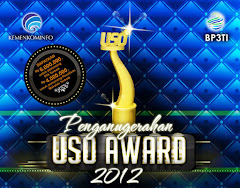From UNICEF Indonesia
By:
Astrid Gonzaga Dionisio, Child Protection Specialist
Yogyakarta, June
2014 - When I attended a discussion on child protection
in Yogyakarta recently, one of the participants really stood out.
Ibu Prihatin is a mother of three and
a graduate of junior high school from Kulon Progo District. She
understands very well what is needed to provide her children with
all the support they need to succeed in school – and she loves to
talk about it.
“We have to make
sure they have breakfast in the morning and that their uniforms are
clean and in order,” she said when participants were asked to
discuss how to prevent neglect.
Ibu Prihatin has been participating in
the Family Hope Programme (PKH - Program Keluarga Harapan)
since 2008. Through the programme, the Indonesian government
provides conditional cash transfers to the poorest families to
improve their access to health and education services.
One of the conditions is
that family members attend these kind of family development sessions
to better understand the impact of child neglect and how to prevent
it. They also learn about the risks of exploitation, be it for
labour or even worse for prostitution.
 |
Ibu Prihatin read out result from group
discussion on what needs to be done to prevent child neglect.
© UNICEF Indonesia/2014/Astrid Dionisio |
Children have a right to
basic necessities like food, clothing, shelter and education. And
they have a right to be protected from all forms of exploitation and
abuse. However, parents are often not aware of the risks and the
impact of neglect and exploitation.
Ibu Prihatin said this
was the first time she had heard such subjects discussed.
“The topics are
interesting,” she said. “I have learned many things that will
help me bring up and nurture my children better, so they can succeed
in their education and are prepared for their later life.”
She hopes the family
development sessions will help prevent child neglect and
exploitation in the community and she wants to support her three
children to attain higher education.
Apart from the child
protection modules, beneficiaries of the PKH programme must also
attend sessions that focus on education, health and nutrition as
well as economic empowerment.
UNICEF has helped to
develop these sessions. The discussion I attended, on child
protection, was a field test to see how much the participants
learned about the subject.
In future, family
development sessions will be run by the PKH facilitators.
One of them is Sapti Puji
Rahayu who was recruited in 2008 for Kulon Progo district, covering
180 beneficiary households.
Sapti Puji Rahayu, PKH Facilitator in Kulon
Progo, Yogyakarta.
© UNICEF Indonesia/2014/Astrid Dionisio |
Sapti ran the fielding
testing session that I attended.
She said discussing all
topics on violence, exploitation and neglect were relevant and
important for protecting children.
“I have found
such cases in our community, and children are suffering,” she
said. “It is important that parents are aware of the risks and the
consequences.”
Sapti says she found some
children in the community who were working instead of going to
school. Others dropped out of classes because their parents weren’t
making sure they attended.
Sapti has enjoyed working
with vulnerable members of the community. “My most memorable
experience was my success in helping a family to obtain their civil
registration documents including birth registration for their
children so they could access education and other services.”
 |
Sapti Puji Rahayu (standing) facilitates the
discussions with PKH beneficiaries.
© UNICEF Indonesia/2014/Astrid Dionisio |
After seeing the family
development session in action, I feel optimistic. The group was open
to talking about sensitive issues like child exploitation and
neglect. Changing this will take time, but the sessions definitely
make a difference and I am proud that we at UNICEF can help make
them as effective as possible.
We need more Saptis who
are willing to listen, work and stay in the community to create
change for the most vulnerable groups, especially children.



























